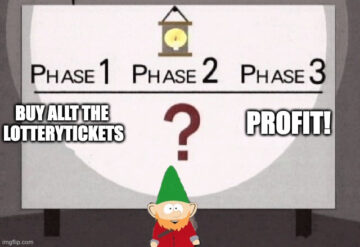by Jonathan Kujawa

The State of Georgia has a lottery guaranteed to turn an enterprising 3QD reader into a millionaire [1].
Playing the lottery can be fun. It is a tradition for Anne and me to buy lottery tickets when stopping for gas on long road trips. Imagining what you’d do with our new wealth is a fine way to pass the long hours it takes to cross the panhandle of Texas. Occasionally, we win back the cost of the ticket. Once or twice, we even doubled our money.
The lottery is often said to be a tax on the mathematically challenged. That saying is certainly nonsense. Pretty much nobody thinks the odds are in their favor. People who buy lottery tickets do so in hope, desperation, or with a “hey, somebody has to win; why not me?” attitude.
After all, the odds of winning the grand prize in the Powerball is 1 in 292,201,338. Every adult in the European Union could buy a ticket, and they might still miss the winning ticket. I could spend $1,000,000 on each of the twice-weekly Powerball drawings, and it would take me more than five years to get through all the possible combinations.
There are a few things with worse odds. A decade ago here at 3QD we talked about how a well-shuffled deck of playing cards is virtually certain to be in an order never before seen in the history of the universe. I wouldn’t bet on guessing that order. But among everyday things, the odds of winning a big lottery are about as bad as it gets.
Gambling odds favor the house. After all, they wouldn’t offer the game if they didn’t expect to make money over the long run. The odds are ever in their favor.

The roulette wheel is one of the simplest games at the Casino de Monte-Carlo. The best bet is a wager that the ball will land on black. Roughly half the wedges are red, and half are black. You might think you have a 50-50 chance of winning. But the Casino de Monte-Carlo is not in the business of losing money. When you look closely, you’ll discover that one of the thirty-seven wedges is actually green. There is only a 48.5% chance the ball will land on black [2]. In that 1.5% lies the Casino’s profit.
Every so often the odds tip in the gambler’s favor. Some games have a “memory” where the past can influence the present. And sometimes those past events make the present a good deal. This is the idea behind card counting: if you’re playing, say, blackjack and track which cards have been played, then you know which cards are yet to come, and sometimes those cards put the odds in your favor. If you bet huge when the odds are in your favor, then, in the long run, you’ll come out ahead. While card counting is usually legal, you won’t be surprised to hear that casinos generally frown on the practice. Winning won’t do you much good if you’re beaten to a pulp out in the desert.
It turns out that state lotteries occasionally have odds in the gambler’s favor. I learned about this phenomenon from a recent paper by Skip Garibaldi. Skip is the director of the Center for Communications Research, La Jolla, and a mathematician whose everyday area of research overlaps with my own [3]. We cross paths on the conference circuit every few years. While well-known in mathematics for his research, he is perhaps better known in the wider world for his papers on the mathematics of the lottery.
Recently Skip wrote an article analyzing a possible strategy of Joan Ginther, the “the luckiest woman on earth.” Dr. Ginther won the lottery four times and amassed over twenty million dollars. While Dr. Ginther has a PhD from Stanford, it is in math education and not obviously useful for winning the lottery. Indeed, as far as I know, Dr. Ginther never explained her extraordinary luck. If you’d like to read more about Dr. Ginther, I recommend this article from Harper’s magazine.
A common form of state lottery is a game with scratch-off tickets. Instead of a random draw of numbers like the Powerball, these games have a fixed number of preprinted tickets. Some are winners and many are losers. Since no additional tickets are printed, you know exactly the prizes and exactly how many tickets are in the initial run. Like counting cards in blackjack, this is a game with a “memory.”
At one extreme, if you are down to the last ticket and know the results of all the others, you don’t have to scratch off the last ticket to know what you’ve won. At another extreme, if you buy two tickets and scratch off one, that slightly improves (or worsens!) the odds of the other being a winner. More generally, as tickets are sold and prizes are claimed, the odds of the game evolve as a result.
For a given scratch-off lottery game, you could track the number of tickets and hope to find one where the odds tilt sufficiently far in your favor. I’ve heard of cases where this happens and a syndicate of buyers buys a large number of tickets. They may not win with any given purchase, but they turn a profit in the long run.
 The surprising thing I learned from Skip’s article is that sometimes the odds are completely in the gamblers’ favor. The total value of the unclaimed prizes exceeds the cost of the remaining tickets. All you have to do is drive around, buy up all the remaining tickets, scratch ’em, and profit!
The surprising thing I learned from Skip’s article is that sometimes the odds are completely in the gamblers’ favor. The total value of the unclaimed prizes exceeds the cost of the remaining tickets. All you have to do is drive around, buy up all the remaining tickets, scratch ’em, and profit!
The website scratchoff-odds.com tracks publicly available information on current scratch-off lottery ticket games. Georgia is one of the state lotteries they track.
Right now, the Big Money lottery in Georgia is a guaranteed winner. One ticket costs $25 and there are 43,573 tickets remaining. This means it will cost you $1,089,325 to buy all the outstanding tickets. On the upside, there are $3,194,440 in remaining prizes. If you buy all the tickets, you’re guaranteed a profit.
The real prize is the ticket which wins you $2,500,000. In this case it is best to not buy all the tickets. Instead, you should scratch them as you go and then stop playing when you hit the grand prize. Buying the remaining tickets to claim the remaining small prizes is likely not worth the effort. In fact, you might actually lose money if the prizes still available at that stage are less than the cost of the tickets. This is exactly the putative strategy of Dr. Ginther that Skip analyzed in his article. He ran the numbers and confirmed that stopping is indeed usually better than buying all the available tickets.
 Even if you buy all the tickets in the Georgia lottery you will still come out streets ahead. You’ll profit by over $2,000,000 when all is said and done. You’ll still be a millionaire even after accounting for the taxes, gas, and convenience store hotdogs required to fuel your ticket-buying expedition.
Even if you buy all the tickets in the Georgia lottery you will still come out streets ahead. You’ll profit by over $2,000,000 when all is said and done. You’ll still be a millionaire even after accounting for the taxes, gas, and convenience store hotdogs required to fuel your ticket-buying expedition.
If I had a lawyer, I’m sure she would remind you there is some small chance someone recently purchased the grand prize ticket but hasn’t yet turned it in. However, this seems unlikely given that only 37 tickets have been purchased in the last six months. Of course, the winning ticket could be in a landfill, behind someone’s couch, or eaten by a dog. That’s a risk you’ll just have to take.
If you want to make your fortune, you’d better hurry. The last day to claim a prize in the Big Money lottery is March 30, 2024.
***
P.S. On a personal note, over winter break I moved from the University of Oklahoma to Oregon State University. I’ve traded the Sooners and tornados for the Beavers and endless rain.
***
[1] All I ask is a modest 10% finder’s fee, donated to the charity of Abbas’s choice.
[2] A roulette wheel in the US has thirty-eight wedges, two of which are green. The odds were slightly worse at the Trump Taj Mahal Casino: there was only a 47.37% chance of the ball landing on black in Atlantic City (and yet Trump’s casino went bankrupt…).
[3] Algebraic groups, if you’re wondering.
